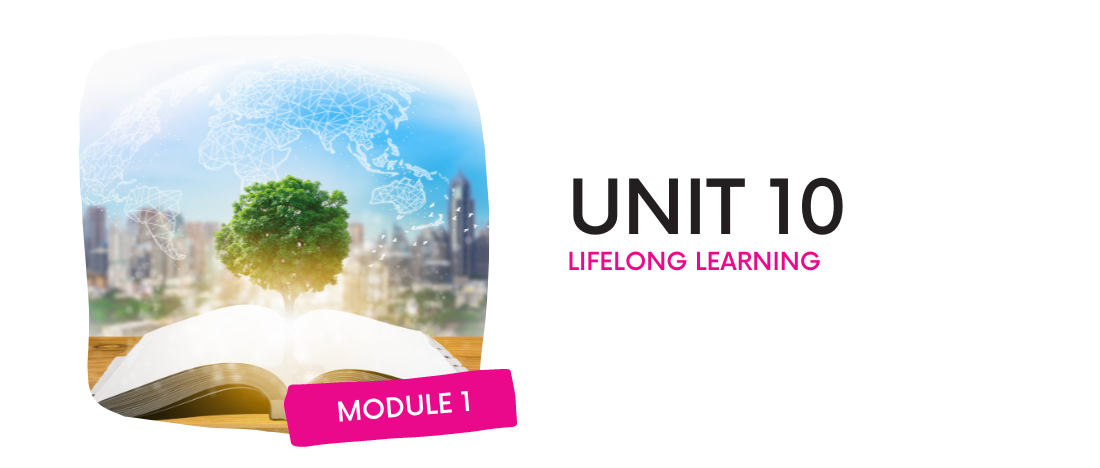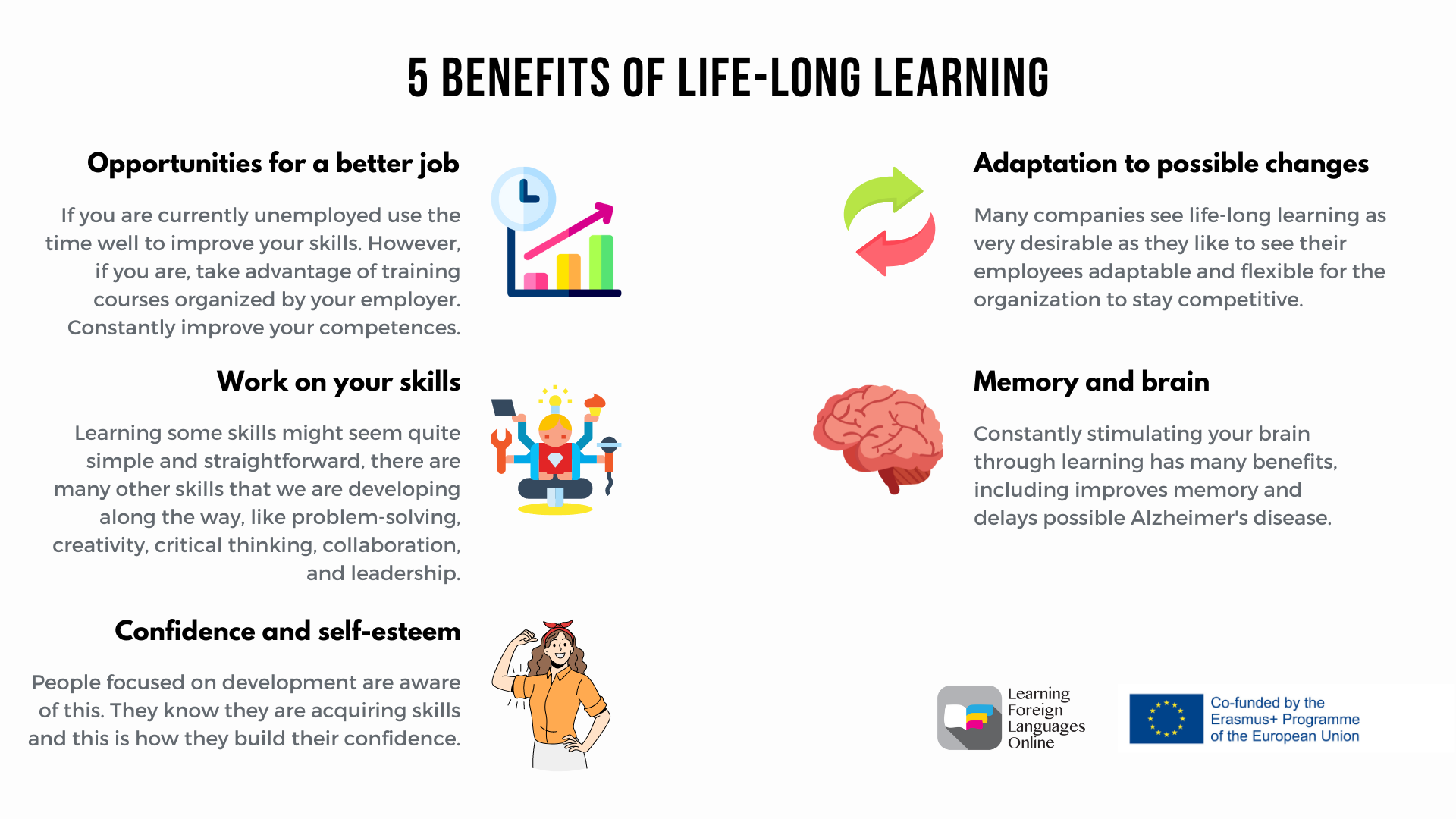
E-course
Lifelong learning
Module 1 | Unit 10
Introduction

„All learning activity undertaken throughout life, with the aim of improving knowledge, skills and competences within a personal, civic, social and/or employment-related perspective“ is how European Commission defined lifelong learning in 2001. It is a form of self-initiated education that is focused on personal development that occurs outside of a formal educational institute, such as school, university, or corporate training.
For example, in childhood, we learn how to talk and ski, as adults we learn how to use a smartphone or how to drive a car. Lifelong learning is usually voluntary and self-motivated, often informal, sometimes self-taught while motivation is out of personal interest. It’s never too late, you’re capable of far more than you’d believe. Albert Einstein once said: “Once you stop learning, you start dying.
Getting started

Tips

Understanding the benefits of life-long learning
What is life-long learning?
Whenever we think of learning we frequently think of formal education that takes place at school, college, university, but it can take place in many forms and many different places. “Formal schooling” is just one type of learning. There are many other opportunities to further your knowledge and develop various skills one needs through life.
Humans have a natural drive to explore, learn and grow. We have natural curiosity, and we are natural learners. We develop and grow thanks to our ability to learn. Although education may maximise our potential to find more satisfying jobs and have more fulfilling careers, it is informal education that makes the difference and all the skills we develop along the way.
If you are reading these lines, it already means that you are a lifelong learner. Whatever your motivation may be – whether you are motivated to learn for personal or professional reasons, lifelong learning enhances our understanding of the world around us and provides better opportunities in life. There are many more reasons why one should never stop learning.
5 benefits of life-long learning
1. Creates opportunities for a better job
Our capacity to learn is directly related to our willingness to learn. If you are currently unemployed use the time well to improve your skills as some skills become outdates and it is important to stay sharp. Employers are looking for employees with transferable skills who are willing to develop and continuously grow. If you are already employed, it is always good to take advantage of any kind of training or take up a course provided by your company thus continuously working on your professional development. Sometimes these new skills might be crucial in being promoted or landing a new job.
In short, the more skills you possess, the more valuable asset you are to your company.
2. Builds new skills and improves those you already have
There are many new skills that one can acquire along the way, such as sewing, learning to ski or learning a new language (like you are doing now). But sometimes some of those skills can help us improve those we already have, such as public speaking, or learning to use new technology such as smart devices or new software applications.
Although learning these skills might seem quite simple and straightforward, there are many other skills that we are developing along the way, like problem-solving, creativity, critical thinking, collaboration, and leadership.
3. Boosts our confidence and self-esteem
Especially if we look at every learning opportunity as a chance to grow. Carol Dweck introduced the concept of “growth mindset” as a mindset that is fully aware that failure is an opportunity to grow, as challenges help us grow. People with growth mindsets like to try new things, believe that feedback is constructive and are inspired by the success of others. Unlike “fixed mindsets” that believe failure is the limit of their abilities, that they are either good at something or they are not. They do not like to be challenged and their potential is predetermined. When frustrated, they give up. Life-long learners tend to have growth mindsets and they are aware of their development which is why this boosts their confidence and self-esteem.
4. Nurtures curious minds, and makes us more adaptable to change
Not only does life-long learning help us develop and grow, but it also keeps us curious and helps us find what inspires us and drives our motivation further. You never know where this curiosity might lead you and what kind of new doors it might open for you.
Many companies see life-long learning as very desirable as they like to see their employees adaptable and flexible for the organization to stay competitive.
5. Improves memory and keeps your brain healthy
There is a common belief that continuous learning and having an active mind throughout life may delay the progress of some forms of dementia. There is no doubt that having an active brain has many advantages. Having improved memory, being one of them. Some studies have shown that learning something new, for example a new skill, or taking up a new hobby can help boost your memory as it increases the efficiency of your brain. “If you don’t use it, you lose it” is a saying commonly used to refer to muscles in our body, when in fact the same could be applied to our brain. One study conducted on Harvard Medical School found that seniors involved in higher levels of intellectual stimulation had a considerably marked delay when it comes to the onset of memory issues and Alzheimer’s symptoms.
Did you know that you can rewire your brain and create new neural pathways until the day you die? Therefore, learning something new and having active hobbies and skills increases efficiency of your brain activity – certain high-challenge activities strengthen the numerous networks in your brain. Maintain your brain, just like you would any other muscle in your body. Paul Nussbaum, PhD, director of the Aging Research and Education Center in Pittsburgh said:
“Every time your heart beats, 25% of that blood goes right to the brain. But while exercise is critical, it may be education that is more important. In the 21st century, education and information may become for the brain what exercise is for the heart.”

More resources

Practical tasks

 Future diary entry: Visualize yourself in 10 years after you have already become fluent in the foreign language you are learning. Imagine all the benefits this knowledge has brought you. Write a page in your diary on how much your life has changed so far because you have learned your target language.
Future diary entry: Visualize yourself in 10 years after you have already become fluent in the foreign language you are learning. Imagine all the benefits this knowledge has brought you. Write a page in your diary on how much your life has changed so far because you have learned your target language.
 Create a list of all the skills you already possess and develop continuously, for example: driving, cooking, exercising… all the skills you are perfecting passively – effortlessly. Make a board and a list of the skills you could be perfecting while learning a foreign language effortlessly and then do it – watching TV in a foreign language while cooking, listening to songs in a foreign language while driving (improving listening skills)…
Create a list of all the skills you already possess and develop continuously, for example: driving, cooking, exercising… all the skills you are perfecting passively – effortlessly. Make a board and a list of the skills you could be perfecting while learning a foreign language effortlessly and then do it – watching TV in a foreign language while cooking, listening to songs in a foreign language while driving (improving listening skills)…
 Create post-it cards that contain the following phrases: “Good job!” and “Not yet”. Every time you accomplish a certain goal, award yourself with a “good job” card in order to boost your self-esteem. In case you realize you haven’t reached a certain goal yet, take a “not yet” card. It is important you realize that you did not fail, but just haven’t reached a certain level yet. Life-long learning is a long process and it is necessary to allow yourself time to reach the goals that you want to reach.
Create post-it cards that contain the following phrases: “Good job!” and “Not yet”. Every time you accomplish a certain goal, award yourself with a “good job” card in order to boost your self-esteem. In case you realize you haven’t reached a certain goal yet, take a “not yet” card. It is important you realize that you did not fail, but just haven’t reached a certain level yet. Life-long learning is a long process and it is necessary to allow yourself time to reach the goals that you want to reach.
 Let’s do some research! Look at job postings, first find all the jobs you can apply for with your current skill set. After that find jobs you could apply for after reaching your language learning goals. Are there more jobs you can apply for? Can you look for jobs in different countries now? Let’s expand your research, now that your target language knowledge has improved maybe you can take different courses on your lifelong learning journey and be even more competitive in the job market or simply make your life more enjoyable and exciting.
Let’s do some research! Look at job postings, first find all the jobs you can apply for with your current skill set. After that find jobs you could apply for after reaching your language learning goals. Are there more jobs you can apply for? Can you look for jobs in different countries now? Let’s expand your research, now that your target language knowledge has improved maybe you can take different courses on your lifelong learning journey and be even more competitive in the job market or simply make your life more enjoyable and exciting.
 Joseph Joubert once said that “To teach is to learn twice”. When teaching others we get a clear picture of what we have learned and accomplished. At the end of a goal prepare a lesson or a presentation and teach someone what you have learned. Don’t forget to make it simple and clear, because Albert Einstein said: „If you can’t explain it to a 6 year old, you don’t understand it well enough“.
Joseph Joubert once said that “To teach is to learn twice”. When teaching others we get a clear picture of what we have learned and accomplished. At the end of a goal prepare a lesson or a presentation and teach someone what you have learned. Don’t forget to make it simple and clear, because Albert Einstein said: „If you can’t explain it to a 6 year old, you don’t understand it well enough“.
Not only will it help you realize what you have learned, but you will also be able to further develop other skills like presentation skills, communication skills, collaboration and creativity, and this is exactly what life-long learning is all about.
Unit test

